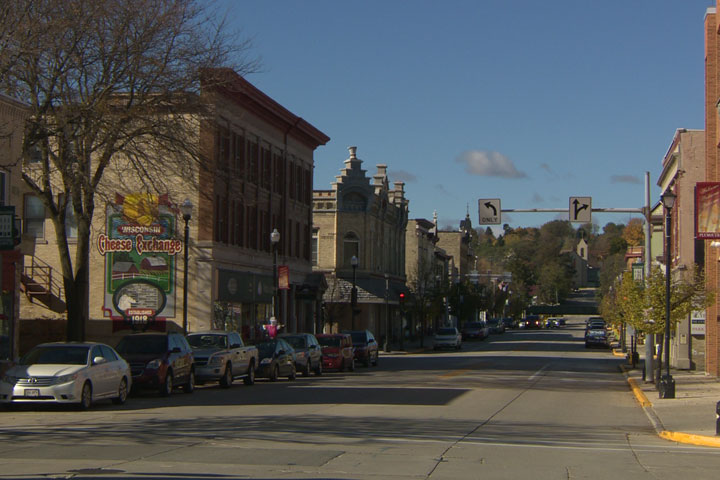PLYMOUTH, Wis. — By all accounts, this is a golden era in Wisconsin.

Unemployment is a paltry 2.9 per cent, and the overall economy is booming.
Foxconn, a major electronics manufacturer, is even planning to open a $10-billion factory in the state, employing up to 13,000 people.
There’s almost too much of a good thing, with a skilled labour shortage starting to cause problems for some employers.

But on Main Street in the town of Plymouth, there doesn’t seem to be a lot to smile about — at least not when you bring up politics.
“It’s not good, not good,” sighs Dave Schaefer, as he sits at the counter of the Hub City Diner.
On a Tuesday afternoon, Schaefer and the other lunchtime regulars are talking about the migrant caravan from Central America that they’ve seen on the news.
“They’re bringing their countries here and they want to re-establish them and that’s not going to work,” he said.
“They’re coming up here to sponge off of us,” fellow diner Don Piper worried.
Asked what they see as the biggest issue in the midterm elections, all of the men at the counter reply, “immigration.”
It might seem surprising that immigration is top-of-mind in a small town 2,100 kilometres north of the Mexican border, but in the heart of Trump country, what the president says often goes.
When Trump talks about migrants, and caravans and immigration, his supporters listen.
“He’s turning out to be one great president,” said Piper, before returning to talk of the caravan.
“There probably are some very good people but there’s some that probably aren’t,” he said, echoing the words of Trump’s 2015 campaign kickoff speech.
WATCH: Surge in voter registration among young adults prompts push to get youth to vote in 2018 U.S. midterms

No one here is talking about the Russia probe, White House turmoil, or the trade fight that’s hurting local dairy farmers.
Aside from immigration, the biggest worry is what happens if Democrats regain control of Congress during the midterm elections. “More chaos,” is the general prediction.

Get daily National news
Most of the talk matches the combative us-versus-them tone heard right across America.
WATCH: Dairy, beer at the heart of the matter in Wisconsin for U.S. midterms

“You know they’re divided on so many issues,” said Becky Schultz as she sips a bowl of soup in a booth at the diner. Her message to politicians everywhere: “Just work together and make the country better.”
That might be wishful thinking at a time like this.
Drive 90 minutes down the highway to Milwaukee, and you could be forgiven for thinking you’ve travelled to another country.
No one here is talking about immigration. The people outside the city’s Public Market have a different worry: President Trump.
“You don’t want to get me going on that dude,” Nancy Shropschrier said when asked what she thinks of the president.
“I think my vote will send Donald Trump a message, don’t you?” Shropschrier added, explaining that she plans to pick Democrats up and down the ticket during the midterms.
“I think he’s insane, I think he’s taking everything in the wrong direction,” said a woman named Joan. Her friend Veronica interrupted to say “I’m right along with her.”
WATCH: Republicans have enough indictments ‘to make up a football team,’ Obama jokes

Mitchell Stock explained that he has often voted Republican in the past, but not this time. “They’ve moved away from the centre,” he said, adding he’s fed up with “the party’s embracing of Trump and embracing of what they deem alternative facts, which are just lies.”
It seems just as in rural Wisconsin, Trump is driving voters in the city to the ballot box — albeit for very different reasons.
In the state capital of Madison, Prof. Barry Burden of the University of Wisconsin gives the lay of the political land.
“I think a lot of the things we’re seeing on the ground in Wisconsin look like what we’re seeing nationally,” he explained.
He says there’s “a Democratic party that’s enthused and active” countered by Republicans “who are playing defence and hoping to hold on to what they have.”
That’s likely to make for some close races at the national, state and local level, in a state that Trump won by fewer than 23,000 votes in 2016.
Both Trump and former president Barack Obama campaigned in the state in the final weeks of the campaign, with Trump visiting cheering crowds in the rural community of Mosinee, and Obama rallying supporters in urban Milwaukee.
WATCH: Ilhan Omar is poised to make history as the first Somali-American elected to Congress and one of the first two Muslim women.

If the political divide seems insurmountable, there’s at least some common ground. It’s fueled by frustration with a political system that feels broken to many on both sides.
“It’s sad that the parties can’t get together on this stuff, they could do so much better if they cooperated,” said soybean farmer Dan Fritz at the diner in Plymouth.
“There needs to come to a point where people are able to talk to each other without it becoming personal attacks on each other,” lamented Mitchell Stock in downtown Milwaukee.









Comments
Want to discuss? Please read our Commenting Policy first.